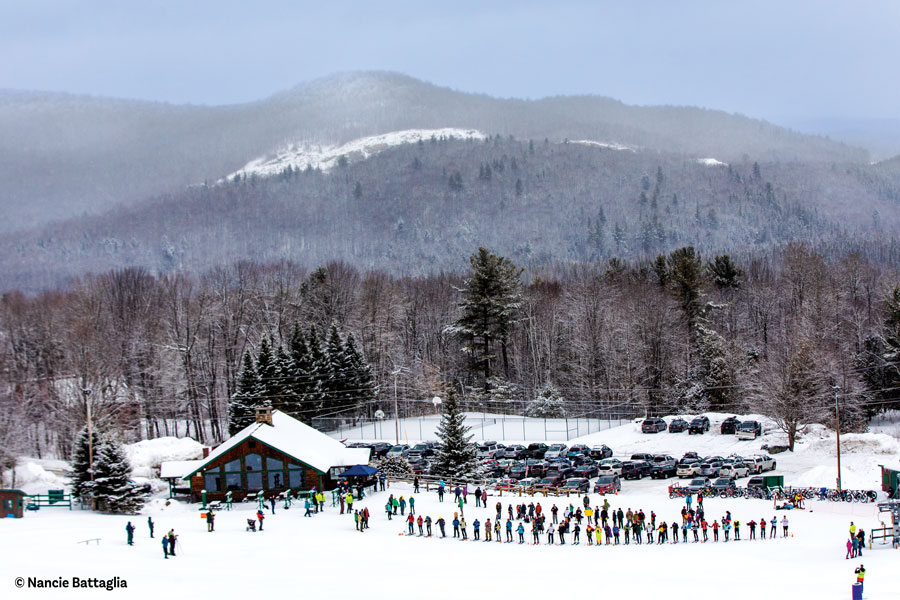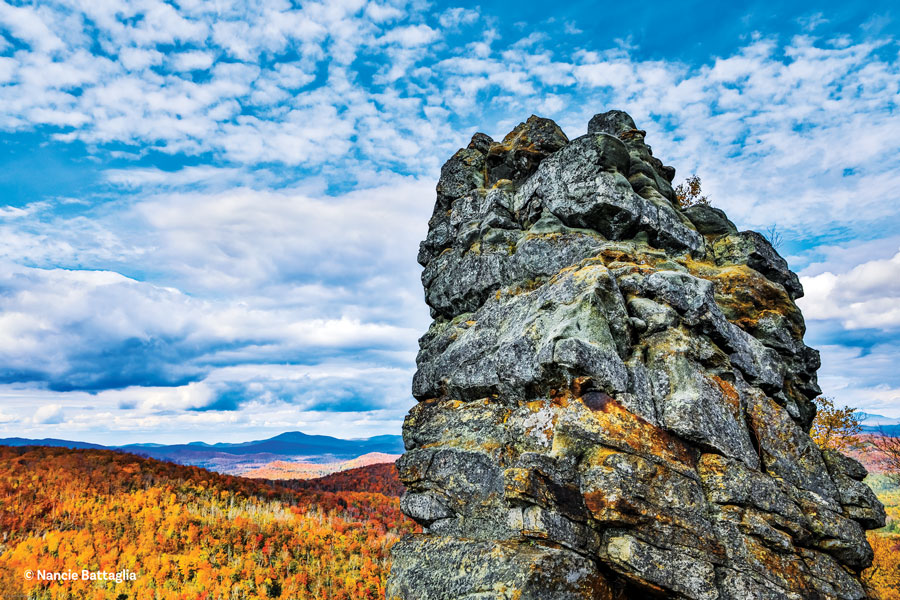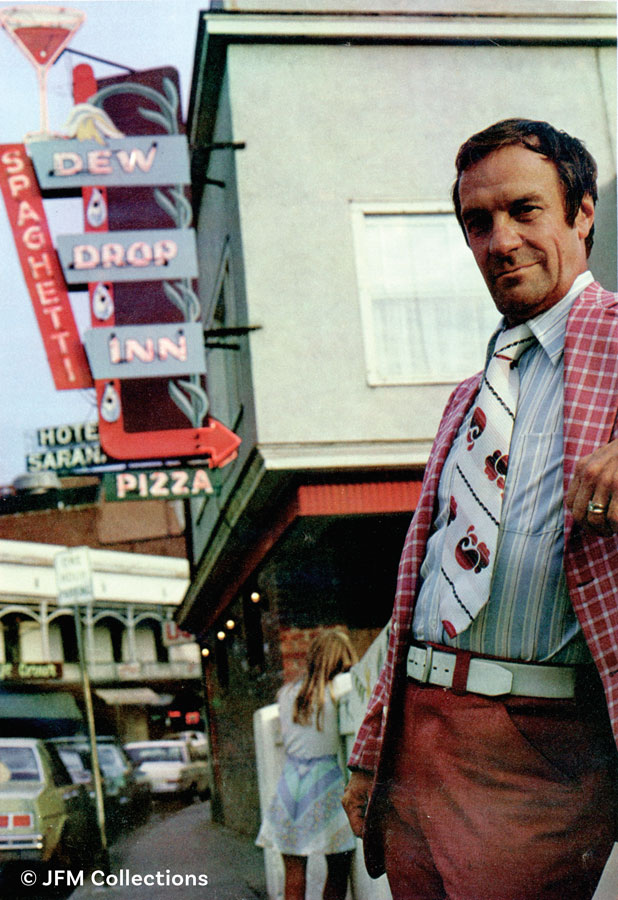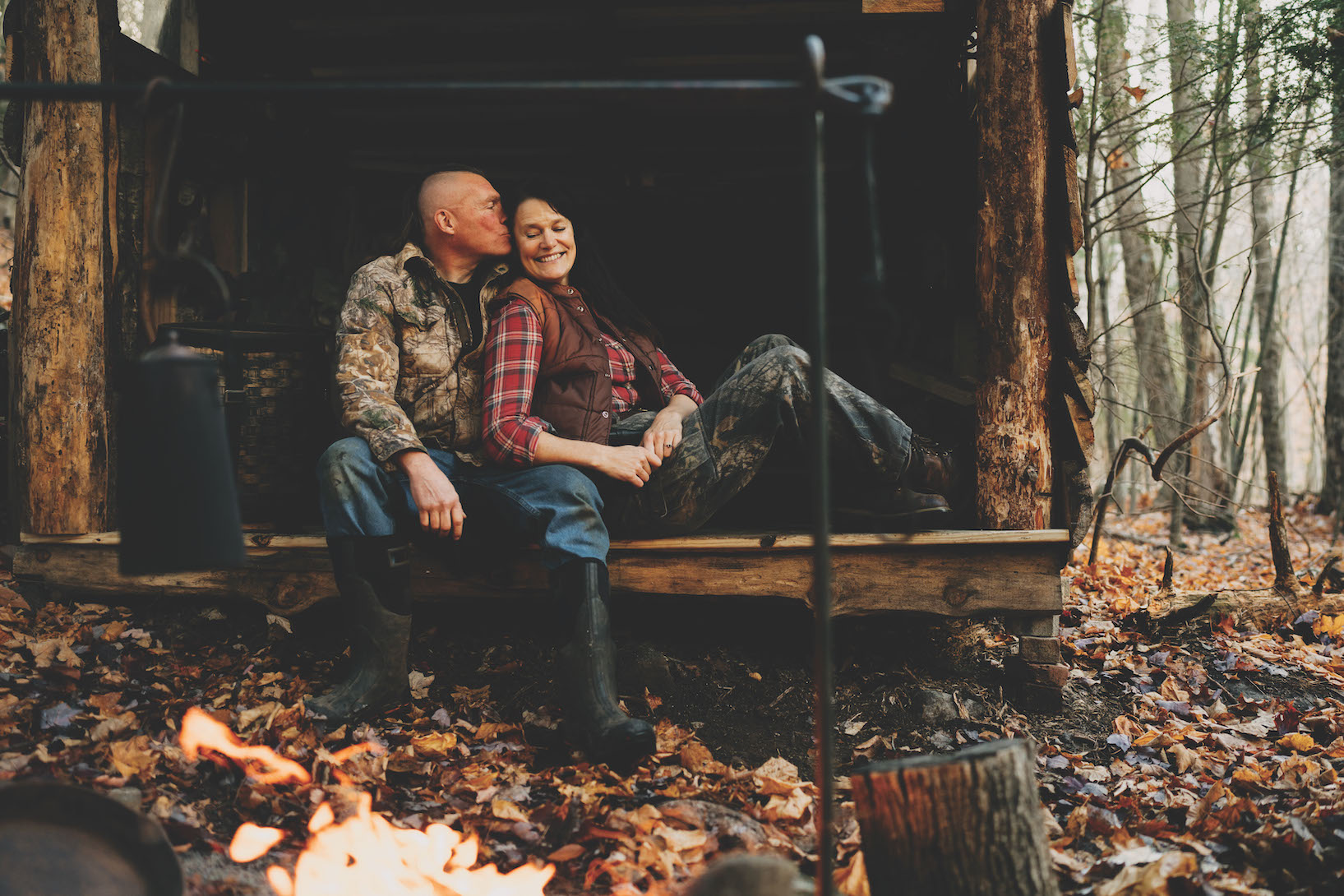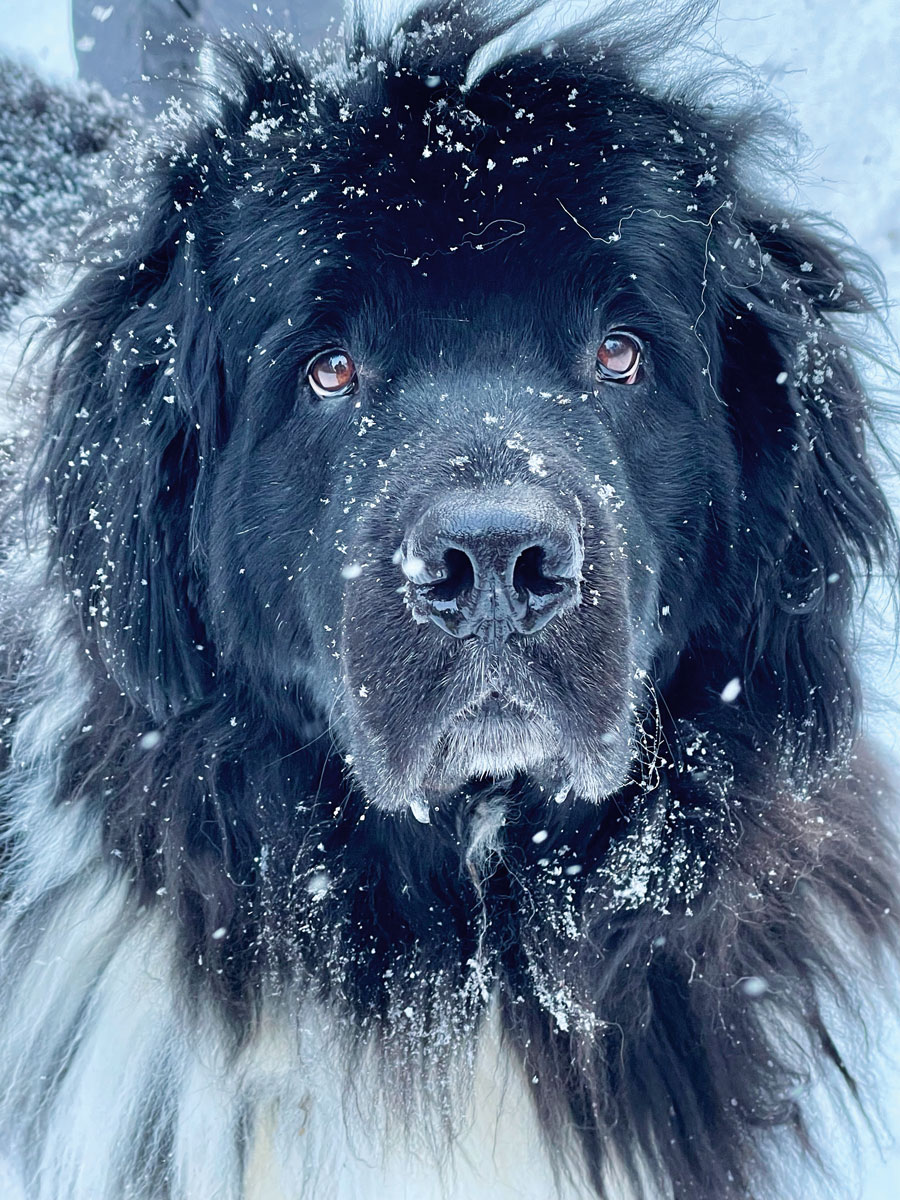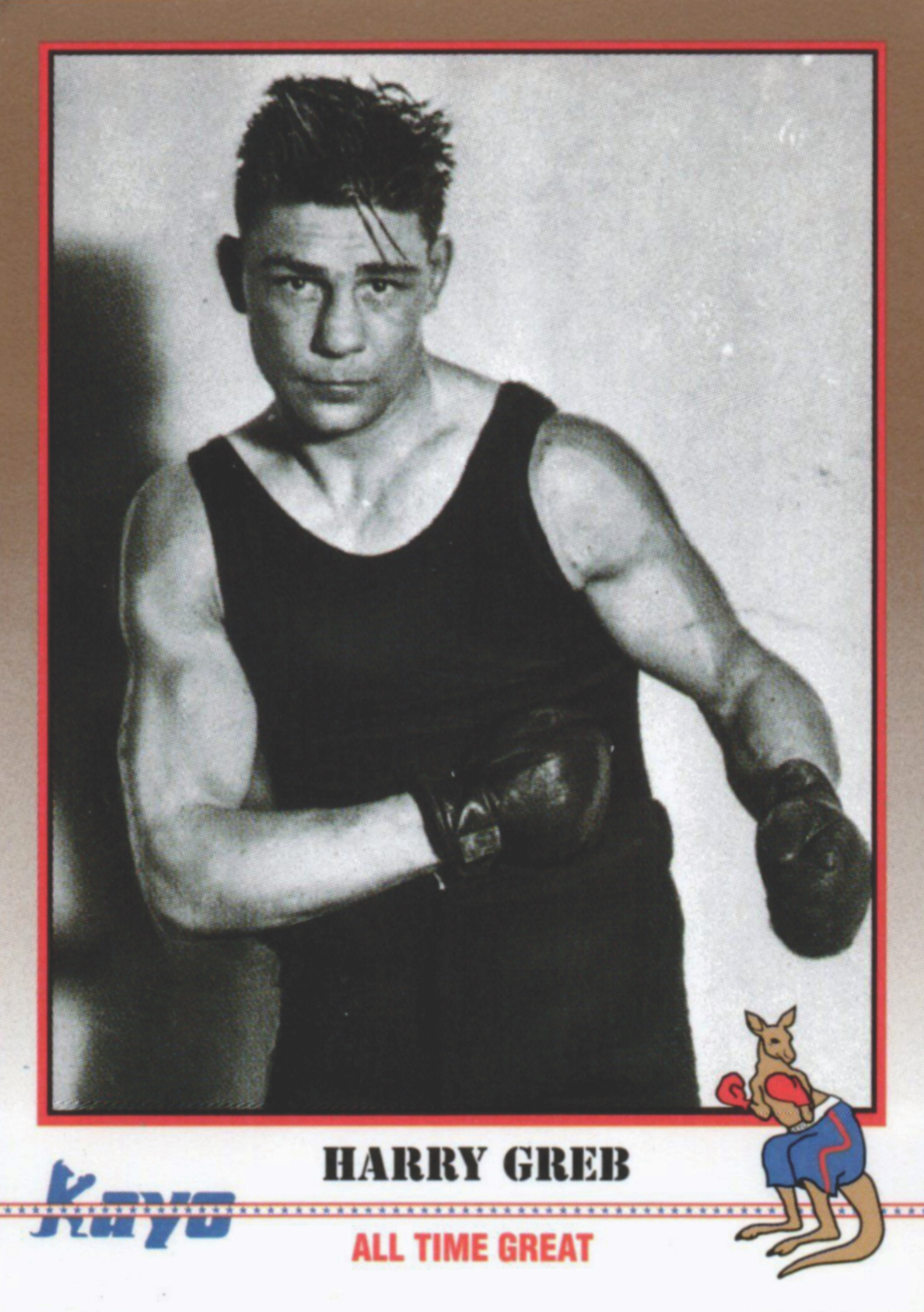Navigating my new life at Bartlett Carry
Boom. I bolt out of sleep into thick dark. What was that? I burrow into the warmth of two wool blankets and a comforter. What was that sound? Did a tree fall on our cabin? What else could it be? Maybe the corner of our tiny bedroom has broken off in the cold and is lying in a splintered heap in three feet of February snow. After a childhood in Buffalo, New York, I should be used to snow. But here it’s been snowing for three days. On the first day, snow settled like a fluffy down coverlet on our roof. On the second day, snow coiled on tree branches like fat lazy snakes. By the third day, I felt completely cut off from the outer world.
And now, the sound of this boom has shaken me awake. Whatever it was, my husband, lying next to me, is still fast asleep. He doesn’t seem concerned, so maybe I don’t need to be either. I cannot be a wimp. I have to figure this out myself. Meanwhile, I fully expect to feel snowflakes land any minute and melt on my face.
I should get up, turn on the light, see what has happened. I begin to emerge from the covers and pause. Damn, we don’t have electricity. Even after four months in this wilderness, I forget sometimes. Curling into a tight ball, I conserve the little warmth inside me. No hope of more sleep. Thinking, thinking. Why did I follow Jay Yardley here in the first place? I do love this man. I was intrigued by the idea of the adventure when I said, “Yes, I will marry you … Yes, I will follow you anywhere.” He was passionate, certain this was the right thing to do. And now our cabin is collapsing in the middle of the night and we probably won’t be able to get out for days and days. Why is he still sleeping and here I am, eyes wide in the crystal black?
The cold and the dark send me to places deep inside that ask questions I don’t allow in the daylight. Really? That part of me asks. Am I up for this? Even in daylight the situation is overwhelming. I can’t stop thinking of the tour Jay took me on after we got here. I had to make him repeat how much land we have. One thousand acres. Bordering two lakes. I can’t wrap my mind around what that means. One thousand acres of wilderness, trees, lakes and rivers. I’m sure I’d get lost out there and never find my way home. There are something like 37 cabins and boathouses, including an abandoned historic 1800s summer resort and a rustic summer camp—all in Jay’s family for four generations. And a crumbling dam. And now we are responsible for it all.
The dark magnifies everything. How in god’s name are we going to deal with 37 buildings? Most are real houses, not cabins, some with five or six bedrooms. They have names like Maple and Birch and Fir. Jay has a vision, he is so sure of himself, but I cannot conceive of how we will possibly do all of this. I’m willing to follow his lead, but I have to admit, in the middle of the tour, it took everything I had to not just stop and say, I can’t do this, I don’t know how to do this.
At least I have learned how to wash the glass chimneys for our kerosene lamps without smudging them so we can have light. And I was determined to figure out how to crank the gas generator to pump lake water up to a thousand-gallon tank on the hill above us. Without that water gravity-feeding to our cabin through pipes buried below the frost line, we can’t brush our teeth or flush the toilet. But no one warned me the roof would crack in the middle of the night. No one warned me how lonely it could be.
Our closest neighbors live a mile away and we don’t know them well. I have no one to talk to but Jay and he is off working most of the day. We are 11 miles from any town. Who would want to live that far from anything? Just yesterday, on the walk down our half-mile driveway, for a moment I thought I saw my sister standing in the woods. I’d give anything to see her. Or anyone. I’m not used to having no one around. When Jay comes home for lunch after working on one building or another, I greet him at the door, lunch ready on the table. I don’t want to miss a second of time with him, even if we eat in silence. Jay is usually preoccupied with a bulldozer that broke down or a chainsaw that needs sharpening.
As I lie here, I think if I could keep the names of the cabins straight, repeat their names over and over, maybe I could go back to sleep. Maple, Birch, Fir, what are the others? Maple, Birch … ? Finally, the warmth under my blankets soothes my racing mind. The scary questions, the doubts and the bare-bones truth recede for at least a while, and eventually I go back to sleep.
A few hours later, daylight shines through our intact window, not streaming in from a gaping hole in the ceiling. Out the window, the clear blue sky looks brittle, as if I could break off a thin piece and crunch it exploding in a blue phosphorescence in my mouth. No snow covers our bed.
“What was that sound in the night?” I ask Jay.
“Ah! That’s the ice on the lake cracking. It does that when it’s really cold.”
Okay, question answered. But the monologue of the night hangs in the cavern of my mind. Do I really want to be here? I’m 24 years old, married only a year and a half, living far from friends and family, homesick for the past puppy pile of my four siblings and the neighborhood kids who gravitated to our apple orchard for kick-the-can. I never had to deal with long, silent days; dark, cold nights; getting lost on one thousand acres; or, for that matter, booming ice. I wonder if I can do this.
I remember vividly how it all began. It was 50 years ago, the fall of 1965, my senior year at the University of Colorado. The moment I walked into Creative Writing 304, I noticed the tall guy with jet-black hair in a Norwegian ski sweater. At six feet tall myself, I still had to look several inches up at him. I could stand straight and tall next to this man without reliving the awkwardness of seventh-grade dancing school, where I towered over every boy. The direct, intent, honest look from under his dark brows transfixed me. As if he could see exactly what I was all about. I wanted to know what he was thinking, what those eyes had seen, where he’d been.
Our first assignment was to write about something that meant a great deal to us. In class, Mr. Warner said, “Jay, let’s hear yours.”
Jay opened his folder. I have kept this folder, so I can still read his unique, half-cursive, half-print scrawl.
“The mist had risen to the height of the mountains beyond the lake. Josh walked down the long winding dirt road. His nostrils closed slightly as he allowed the smell of the balsam fir to gather in his head. It was that Adirondack smell.”
When I heard this, I sat up straighter, leaned forward. I knew that smell of balsam. His character, Josh, was returning home after three years in the service.
“The family had always lived there through hunting, fishing and sugaring seasons. Some had walked down that road and kept on going just as Josh had once done. Some came back to be buried with the rest near the river.”
Place. The setup for this story had such a strong sense of place. I wanted to go there.
That same day in class, I read a story based on my place—my grandmother’s island, 200 miles north of the border in Ontario, Canada—the first place I felt connected to, where my bare feet knew every root, where each early morning my warm skin knew the shock of cool lake water, where my days were filled with parents, sisters and brothers, cousins, aunts, uncles and would-be boyfriends. The “old guard” faction—mainly my cousin Jerry and me, outfitted in blue jeans and moccasins—wanted to retain old ways and traditions, honor the natural setting, no phone or TV. We didn’t even want electricity. Our enemy was my “conniving aunt” with tight dresses, high-heeled, fluffy-toed, sling-back shoes, frizzy Clairol-black, done-up hair, who wanted cocktail parties and the newest appliances.
After class, Jay asked me out to dinner. Over a T-bone steak and baked potatoes at Fred’s Steak House, we talked about tradition and the essential timelessness of land. I told him about my childhood summers on Eagle Island. He told me of his summers in the Adirondack Mountains in northern New York and his long family history there, of his fascination with a place up a river, a place called the Bartlett Carry Club.
“The Bartlett Carry Club?” I asked. “Interesting name. Why is it called that?”
“It’s an old summer resort going back to the 1800s, not used any more, falling into ruins. It’s called Bartlett Carry because it’s a canoe carry between Middle and Upper Saranac Lakes. My great-grandfather was the first in our family to go, in the 1800s. I spent a lot of summers there. Someday I’m going back. I want to take over the family property, restore all those abandoned houses, revive the Bartlett Carry Club. I know there are people who want to be in the woods by a lake, but comfortable, in a place where they can touch down, relax. This is the perfect place. I’ve been all over the world, but I’ve never seen anywhere as beautiful.” He ran long fingers through his black hair. “I have a movie I could show you.”
A turning point in my life, although I didn’t know it then. As I think about it now, many years later, that moment comes right back.
I sat on a straight-back chair waiting for the show to begin. The clicking whir of the 8mm projector broke the silence. Jay had invited me to his small mountain cabin outside Boulder, Colorado, to see this movie. The only light shot from the projector onto the dusty kitchen wall.
Then, instead of specks on the wall, a grainy black-and-white movie emerged. I leaned forward. Jay said, “Okay, this is the beginning of the road going in to our family ‘camp,’ our summer home, on Middle Saranac Lake. The old name is Round Lake. I like that better.” I sat stock-still, engrossed in the slow-motion travel up a narrow dirt road, past white pines and maples, fern-covered rocks and moss on either side.
I knew trees, ferns and rocks like these on Eagle Island. Woods to run free in, canoes to tip over, 22 at the dining-room table, everyone talking at once. In the peace of Jay’s cabin, I dove into the images flickering on the wall. The eye of the camera escorted me around one sun-dappled bend after another. I wanted to watch forever.
Excerpted from Fran Yardley’s forthcoming book, Finding True North, from Excelsior Editions, an imprint of the State University of New York Press.
















